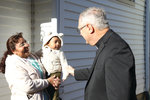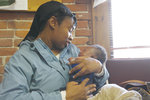



PROVIDENCE — Throughout its existence, Catholic Charities and Social Ministry in the Diocese of Providence has consistently risen to meet the needs of those who are in the most dire of circumstances. These efforts — through prayer and action — have brought the message of Christ’s love to the people of Rhode Island for the past 150 years, meeting their physical and spiritual needs while addressing injustice and advocating for change.
In 1910, 400 delegates from across the country gathered at Catholic University of America to create a systematic approach for the Church’s charitable efforts. Catholic Charities is now one of the largest human services providers in the country, serving over nine million people every year.
Although part of this national initiative, Catholic Social Ministry in Rhode Island has been actively responding to the needs of the forgotten and marginalized for well over 100 years, constantly adapting to aid an ever-changing society.
Presently in the Diocese of Providence, the Office of Catholic Charities and Social Ministry provides more than 25 ministries dedicated to the material and spiritual well-being of Rhode Islanders. They range from emergency basic needs ministries like the Emmanuel House Homeless Shelter and Bishop Thomas J. Tobin’s “Keep the Heat On” program, to ministries that assist young families with diapers and formula like Saint Gabriel’s Call.
“I have been told many times by seniors that we have helped through ‘Keep the Heat On’ or guests at Emmanuel House that we have sheltered that our Church’s assistance has been nothing less than lifesaving,” said James Jahnz, diocesan Secretary for Catholic Charities and Social Ministry. “For these households, they have had nowhere to turn for help. They have been told ‘no’ at every turn. But at their point of great need, the Church has been there to help. It is our faith lived out through our works.”
Other ministries include the diocesan commitment to serve in the local communities like the St. Martin de Porres Multi-Service Center and satellite outreach sites. The diocese also provides chaplaincy care to the infirm in hospitals and visits to those imprisoned through its prison ministry. Elder Services ministries allow for the graceful aging in place for our seniors and the Immigration and Refugee Service office welcomes new neighbors to Rhode Island such as the 100 Afghan evacuees the office is currently assisting.
During the 19th century, the young immigrant Church in Rhode Island witnessed an alarming amount of social problems left behind in the wake of industrialization — orphaned children, insufficient healthcare, and widespread poverty among the factory workers. To address these needs, Bishop Matthew Harkins united the wealthy and rising middle class to build the financial foundation for diocesan charitable efforts.
Under his leadership in 1852, the Sisters of Mercy started St. Xavier’s Academy, the first orphanage in Providence. The home opened in the face of much protest from a large anti-Catholic movement still existing in the state. In 1855, posters appeared around town threatening an attack on the orphanage. The bishop and mayor rallied a troop of 400 men to protect the sisters. Their ministry continued uninjured.
After opening St. Xavier, the bishop funded the construction of several other orphan asylums around the state, including St. Aloysius Orphan Asylum. In 1892, the St. Vincent de Paul society opened an orphanage on Park Street and shortly after, started the first home for infants on Regent Avenue. Under the guidance of Bishop Harkins, St. Vincent de Paul organized carnivals and winter concerts to raise money for these homes. In 1912, the Francisican Missionaries of Mary staffed St. Francis, the first orphanage in Woonsocket. An asylum in Newport, Mercy Home, opened shortly after in 1910.
At the turn of the century, many parents spent their days working in the mills, leaving no one at home to care for their young children. In response, several day nurseries opened throughout the state. The Woonsocket based Franciscan Missionaries of Mary opened the first in 1904, and the trend eventually spread to Providence and Newport by 1915.
The Office of Catholic Charities and Social Ministry presently continues the tradition of providing childcare assistance to working families. Shortly after the four diocesan operated childcare centers closed, the Cabrini Fund was established to allow eligible families to choose their own child care provider from over 2,000 licensed providers in the state, contributing up to $100 a month towards childcare for working families.
Care for the elderly and sick was also a concern for the Church during social ministry’s early years. In 1892, Bishop Harkins founded St. Joseph’s hospital and in 1904, the largest French Canadian parish in Woonsocket opened Hospice St. Antoine to care for their elderly.
In the 1970s, Sister Rhea LaChapelle, a Sister of St. Anne, started the Neighborhood Friendly Visitor Program to address a unique need she saw among the elderly in the state. “Our religious communities told us that there were needs to be filled and we should look and fill those needs,” LaChapelle said at the time.
While visiting a nursing home in Central Falls, LaChapelle noticed elderly members of the community arriving in the morning to spend their days visiting the residents. “I saw people coming in that didn’t even know the people in the nursing home. I realized they were lonely and that’s when we found the visitor program,” she said. “People need people.”
LaChapelle asked senior centers and parishes to identify elderly members of their communities who were alone and rallied volunteers from parishes around the state to engage in a formal training to visit the homebound. Within three years, Sister’s program was well underway, powered by more than 150 volunteers who provided companionship to elderly all over the state. LaChapelle’s model gained national attention, and other states began implementing visitor programs based on Rhode Island’s design.
Long before the Neighborhood Friendly Visitor program took root, the diocese established a formal Catholic Charities office. In 1925, under the leadership of Bishop William A. Hickey, a large network of ministries was underway, but they still faced the challenges of an increasing population’s growing demand for social services. At this time, Bishop Hickey surveyed the needs of the state and observed a network of Catholic charitable institutions bursting through the walls of their buildings, unable to find efficient ways inside small spaces to meet the needs of an ever growing population.
Bishop Hickey appointed the first director of the then-Catholic Charities Bureau to coordinate the various diocesan social ministry efforts. The man for the job, Father Charles C. Curran, spent a year studying social work at Catholic University of America. He returned with a systematic approach to organize the various ministries. He started the Catholic Charities Appeal to fund new construction in 1927, raising $307,101, a figure that continued to increase in the subsequent two years. In 1930, charitable contributions in the state hardly felt the ripples of the stock market crash, garnering a miraculous $302,133 in donations. Around this time, Bishop Hickey worked with the Society of St. Vincent de Paul to open an organization in every parish which would help to address the basic needs of Rhode Island’s unemployed and underemployed.
Following in the footsteps of Bishop Hickey and other leaders before him, Bishop Thomas J. Tobin continues to perpetuate the heartbeat of social ministry in Rhode Island. In 2005, as home heating costs reached record highs, Bishop Tobin began the “Keep the Heat On” challenge. During the 2022 season, the Diocese of Providence granted $411,637 in heating assistance, the most aid it has provided in the program’s 17-year history. Since 2005, the program has raised nearly $4 million to help more than 16,000 Rhode Island families and individuals keep warm in the winter. The program is funded through donations from individuals, parishes, schools, organizations, along with grants from corporations and the annual Catholic Charity Appeal.
“The Diocese of Providence assists tens of thousands each year with housing, heating, food, and shelter,” said Jahnz. “It helps hundreds more build a life and a home here in Rhode Island and throughout the past two years, it has helped thousands cope with a pandemic with material and spiritual assistance.”
Jahnz explained that the generosity of the faithful who support these ministries is deeply entwined with good works, and the result of their gifts is profound.
“They are truly living out their faith by their actions,” he said. “They are providing shelter for their brothers. They are ensuring that the sick and imprisoned are visited. They are helping the widowed. Through their support they are making certain that their brothers and sisters in need are cared for.”
It’s likely impossible to put a number on individuals helped by the Diocese of Providence or donations gifted over the past 150 years, but the diocese is dedicated to continuing to serve their neighbors across the Ocean State for many centuries to come. And thanks to the compassionate assistance of those who work in these ministries, these individuals and families in need will always be treated with dignity and loving care.
“The Office of Catholic Charities and Social Ministry has staff that have great care and concern for the people they serve. For many it is a lifetime call to help those in need, whom they consider their brothers and sisters. As John Barry, my predecessor said upon retiring after 50 years of working for the Diocese of Providence, ‘To work to right injustices in society, respond to our neighbors in need and to be part of spreading the Good News is the best job that one could hope for.’”
This article includes historical reports from The Providence Visitor archives.